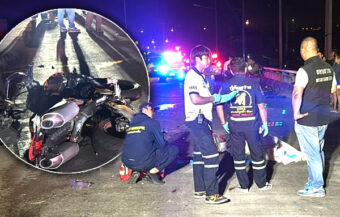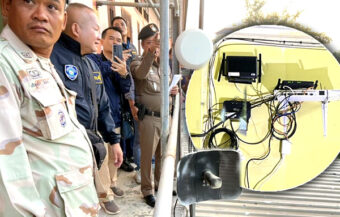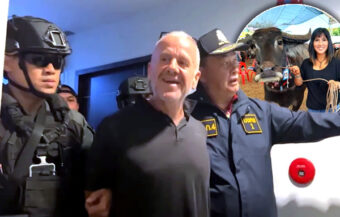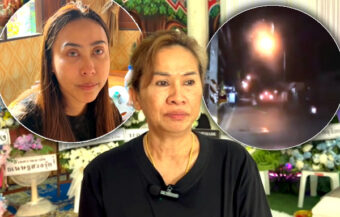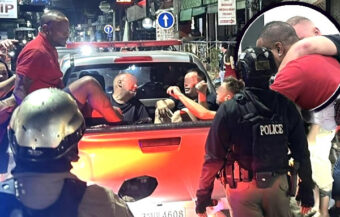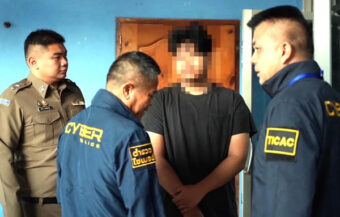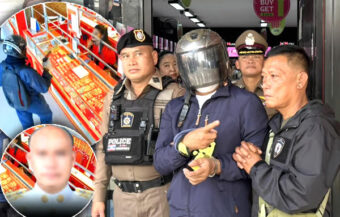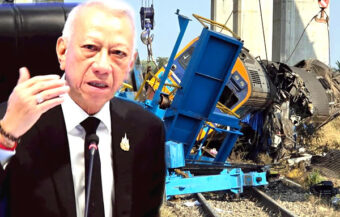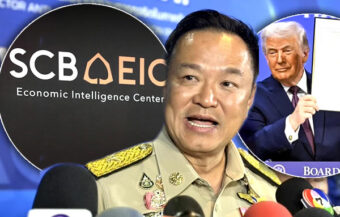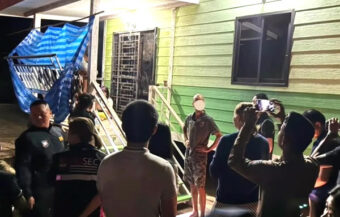Hun Sen threatens Thai protest leader Jatuporn with a sinister warning as Cambodia demands Thailand reopen all border crossings within 24 hours or face a ban on Thai fruit imports. Tensions soar, with both nations rejecting talks and risking economic fallout.
Relations between Thailand and Cambodia deteriorated sharply on Monday, as Thailand’s Ministry of Foreign Affairs expressed disappointment over the outcome of last weekend’s Joint Border Commission (JBC) talks with Cambodia. The ministry accused its eastern neighbour of lacking sincerity in efforts to build peace and mutual understanding. Meanwhile, Prime Minister Paetongtarn Shinawatra moved to emphasise Thailand’s firmly united position during a meeting at the Prime Minister’s official residence, the Phitsanulok Mansion. However, Cambodia’s de facto leader escalated tensions further. He issued a demand that Thailand fully reopen all border crossings or face a ban on Thai fruit imports into Cambodia. In addition, he delivered a veiled but pointed warning to veteran Thai protest leader Jatuporn Prompan. His remarks suggested personal animosity and hinted at his capabilities in a tone some observers saw as ominous.
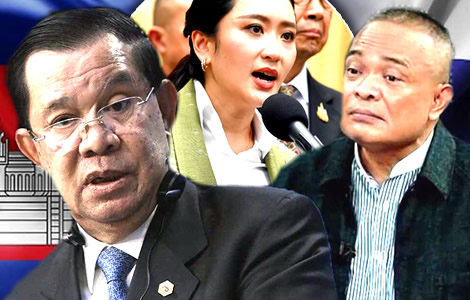
Cambodia’s de facto leader Hun Sen on Monday issued an ultimatum to Thailand. He demanded the full reopening of all shared border crossings within 24 hours. If not, Cambodia would immediately ban the import of all Thai fruits and vegetables.
This threat came during a public address in Phnom Penh before a Senate session. Hun Sen still wields significant power despite no longer being prime minister. He ordered his elite BHQ or bodyguard division to deploy near the Thai-Cambodian border.
Tensions have escalated since a skirmish occurred on May 28 in the disputed Chong Bok area. Cambodian soldiers reportedly crossed into Thai territory and dug a trench. Thai military forces responded, prompting Cambodia to withdraw and fill the trench.
Hun Sen accuses Thailand of double standards on border and delivers a gangster-like threat to protest leader
Hun Sen accused Thailand of double standards. He said the Thai military unilaterally restricted access. Yet when Cambodia mirrored those actions, Thailand demanded talks. Therefore, he stated, Cambodia would not negotiate under pressure.
“If Thailand does not open all border checkpoints with Cambodia, starting tomorrow, we will ban Thai fruits and vegetables,” Hun Sen declared. He also made it clear that Cambodia would not sit at the table with Thai authorities on this matter.
Moreover, Hun Sen issued a direct and personal threat to Jatuporn Prompan, a veteran Thai protest leader. Jatuporn once sought refuge in Cambodia during political unrest in Thailand. As a result, Hun Sen reminded him of the past.
“Be humble, little brother,” Hun Sen said. “You fled to Cambodia. I welcomed you, fed you and protected you. Now you come back to attack the country that once sheltered you.”
He then added a menacing statement. “You know how capable I am. Show some respect.”
This warning was not just personal. It carried the tone of a gangster-like threat. It showcased Hun Sen’s continued influence and unapologetically strongman style.
Hun Manet orders border provinces to prepare for fallout as Thailand stands firm against Cambodian threats
At the same time, Hun Manet, Hun Sen’s son and Cambodia’s current prime minister, ordered border provinces to prepare for fallout. Specifically, seven provinces were told to prepare for the return of Cambodian workers in case ties worsen.
Meanwhile, the Thai government responded with firmness. Prime Minister Paetongtarn Shinawatra addressed the press after a high-level security meeting. She declared Thailand would not be threatened or intimidated by Cambodia.
“Thailand is united. We will not tolerate maltreatment, accusations, or threats from any party,” she said.
She added, “Our country has dignity. Our country is strong.”
Furthermore, she criticized Cambodia’s mode of communication. According to her, diplomatic matters should be handled through official channels, not social media.
“That kind of communication does no good for either country,” Paetongtarn noted. She pointed out that Cambodia had previously agreed to wait for formal conclusions before public comment.
Thai PM warns border closure hurts both countries and proposes military talks to ease ongoing tensions
Additionally, she expressed concern about economic impacts. “The announcement about closing the border right away affects both Thais and Cambodians,” she said. The Thai government, she emphasized, was also worried about trade.
In explaining recent restrictions, Paetongtarn said border hours were changed for safety reasons. She cited the deployment of long-range weapons as justification.
“If the opening hours were not rescheduled and there was an accident, the damage would be great,” she said.
She proposed that both militaries meet through the Regional Border Committee (RBC) to avoid further conflict. The RBC is scheduled to meet on June 27–28.
Separately, Lt. Gen. Boonsin Paadklang confirmed that troop withdrawals would be discussed. His goal was to reduce border tensions and prevent escalation.
On Monday, Thailand’s Ministry of Foreign Affairs issued a formal statement. It condemned Cambodia’s lack of cooperation. The statement followed a Joint Boundary Commission (JBC) meeting held in Phnom Penh over the weekend.
Thailand condemns Cambodia for ignoring talks and taking border dispute to the International Court of Justice
Thailand said it was disappointed with Cambodia’s decision to bypass talks and go directly to the International Court of Justice (ICJ). Cambodia petitioned the ICJ regarding four disputed areas along the border.
These areas include Ta Muen Thom, Ta Muen Toch, Ta Kwai, and Chong Bok. The ministry argued that the ICJ petition showed Cambodia lacked sincerity in bilateral engagement.
Moreover, the Thai ministry said Cambodia misrepresented the weekend meeting. Thailand denied discussing the ICJ issue or a specific border map during the JBC talks. It warned Cambodia against spreading misinformation.
Thailand also rejected Cambodian accusations from the May 28 incident. Cambodia claimed Thai troops opened fire. Thailand said its forces acted in self-defence after Cambodian soldiers entered the disputed territory.
Thai military says Cambodian troops breached no-man’s-land agreements causing border skirmish and tensions
According to Thai officials, Cambodian troops set up a trench and refused to retreat. That action, they said, broke existing no-man’s-land agreements.
Cambodia has since dismantled the trench and pulled back. However, the skirmish inflamed bilateral tensions. As a result, military and diplomatic communication remains strained.
Even so, Thailand confirmed it will host the next JBC meeting in September. Prasas Prasasvinitchai led the Thai delegation in the last session. His counterpart was Lam Chea, Cambodia’s Minister in charge of Border Affairs.
Meanwhile, cross-border trade hangs in the balance. Cambodia is a major importer of Thai agricultural products. Any ban would hit small exporters and farmers especially hard.
Thai Chamber of Commerce warns border dispute could damage thousands of livelihoods amid stalemate
The Thai Chamber of Commerce has raised concerns. Business leaders urged both sides to de-escalate. They warned that further disruption could affect thousands of lives.
Despite these warnings, both governments remain firm. Hun Sen has issued a 24-hour ultimatum. Thailand has refused to be pressured.
Cambodia outflanks Thailand again even as talks took place in Phnom Penh. Insists on ICJ court ruling
Cambodia a big loser from the border spat. Over 1 million Khmer workers in Thailand unlikely to return
As of Monday evening, border access remained limited. No announcement was made regarding compliance with Cambodia’s demands.
The situation is volatile. Yet both nations have signalled interest in future talks. The question is whether strong words will lead to real diplomacy or further confrontation.
In the meantime, those who live and work along the border are caught in the crossfire. Their lives depend on decisions made in Phnom Penh and Bangkok. However, the agenda for now appears to be driven by the wiles of Cambodia’s strongman.

